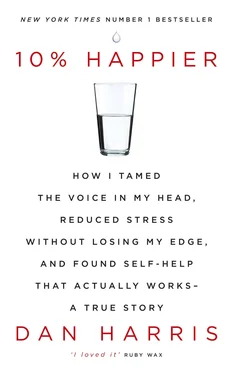This was humbling. I had always fancied myself to be reasonably self-aware. My mind, a perpetual motion machine of plotting, planning, and evaluating, had apparently missed something essential. The doctor had a couple of theories. It was possible, he said, that the horror of what I had witnessed overseas was too much for my conscious mind to handle. It was also possible that I was subconsciously pining for the adrenaline of war zones—that I was essentially in withdrawal from journalistic heroin. Or perhaps it was a combination of both. He recommended antidepressants. Unfortunately, I had already started self-medicating.
Although many of my friends partook, I had made it through high school, college, and my twenties without experimenting with hard drugs. Alcohol and a little weed, yes, but nothing more. I was never even tempted—or to be more honest, I was scared. On a few occasions, pot had made me so intensely paranoid that I felt like I was incarcerated in an inner Mordor. I figured harder drugs had the potential to be even worse.
However, my psychosomatic illness had left me feeling weak and adrift. One night, I agreed to go to a party with a guy from the office. We were at his apartment, having a quick drink before going to meet his friends, and he shot me an impish look and said, “Want some cocaine?” He had offered before and I had always demurred, but this time, on an impulse, I caved. Here I was crossing what had always been a distinct, bright line, in an utterly haphazard fashion. I was thirty-two years old.
The drug took about fifteen seconds to kick in. At first, it was just a pleasant electric sizzle coursing through my limbs. Then I noticed a disgusting ammonia-flavored postnasal drip. It didn’t bother me, though, because it was accompanied by a triumphant horn flourish of euphoric energy. After months of feeling run-down and ragged, I felt normal again. Better than normal. Rejuvenated. Restored. Logorrhea ensued. I said many, many things over the course of the evening, one of which was: “Where has this drug been all my life?”
Thus began what my friend Regina sardonically called my Bright Lights, Big City phase. That night, at the party I went to with the guy from work, I made a bunch of new friends. And those people also did cocaine.
With coke, you never reach satiety. It hits, it peaks, it fades—and before you know it, every cell in your body is screaming for more. It’s like that line from the poet Rilke, who referred to the “quick gain of an approaching loss.” I chased this dragon with the zeal of the convert. Late one night, I was partying with another new friend, Simon—a man who had, to put it mildly, a great deal of experience with drugs—and when he was ready to go to bed, I insisted we stay up and keep going. He looked over at me wearily and said, “You have the soul of a junkie.”
Then I discovered ecstasy. I was with some friends in New Orleans when someone started handing out little blue pills. They said it would take a half hour or more before I felt anything, and as I waited, I strolled through the city’s French Quarter. I knew I was high when we passed a piano bar where they were playing Bon Jovi’s “Livin’ on a Prayer,” and it sounded transcendent.
I couldn’t believe one pill could make me so happy. I felt as if my torso was swaddled in heated cotton balls. The very act of talking, the mere vibration of my vocal cords, was blissful. Walking was a symphony of sensual pleasure, with waves of euphoria melting all the calcified barriers of self-consciousness. I could even get out of my own way to dance.
Sadly, the pain of the comedown was proportional to the power of the high. Reality reentered the scene with a pickax. The lesson for the neophyte drug taker was that there is no free lunch, neurologically speaking. On the day after ecstasy, my serotonin stores would be utterly depleted. I often found myself overwhelmed by a soul-sucking sense of emptiness, a hollowed-out husk of a man.
It was partly because of the severity of the hangover—cocaine, too, left me cracked-out and colicky for at least twenty-four hours—that I was meticulous about never doing drugs when I had to work the next day. Not only did I largely quarantine my substance abuse to weekends, but there were also long stretches of time when I was traveling for work and completely abstinent—covering the 2004 Democratic presidential primaries, for example. The pull of drugs was powerful, but the tug of airtime was even more so. In fact, during one of the years when I was using drugs, I was ranked as the most prolific network television news correspondent. This only served to compound my master of the universe complex, convincing me I could fool everyone and pull it all off.
On some level, of course, I knew I was taking a massive professional risk. If my partying leaked out I could have been fired. And yet I carried on, impelled forward blindly, my common sense hijacked by the pleasure centers of my brain. I kept using drugs well past the point where I had been diagnosed with depression. I failed—or refused—to connect the dots.
I had always had an addictive personality. It’s a lucky thing that the first time I tried cigarettes, at age fourteen, I puked. Otherwise, I might have picked up a lifelong habit. One of my most vivid childhood memories was playing ball one afternoon with my mom and brother on top of a hill near our house. I kept telling them I needed to use the bathroom, and would then sneak back to the kitchen to take slices of cake from the fridge. On the fourth or fifth trip, after realizing I had eaten nearly the whole thing, I came back and tearfully confessed. Not long afterward, I found out where my parents—who were very strict about candy—had hidden a bag of lollipops on a very high shelf in the kitchen. Over the course of several days, I repeatedly weaseled up there and ate them all. The power of craving, the momentum of wanting was always difficult for me to resist.
Now, as a budding drug abuser, it wasn’t just the professional risks I shrugged off. I developed persistent chest pains that got so bad that one night I went into the ER to get checked out. A young medical resident told me that the trouble was very likely caused by cocaine, which I had reluctantly admitted to using. Despite her pleading, I left the hospital and pretended the encounter had never happened.
Every drug recovery narrative has to have its bottom, and mine—or at least my first one—came on that warm June morning on the set of GMA when I melted down on live TV. Ever since my return from Iraq, I’d been occasionally filling in for Robin Roberts as the News Reader. It was a huge opportunity, one I valued immensely and hoped would turn into something larger. I was used to the routine—I’d been appearing semi-regularly for a few months now—so I had no reason to think this morning would be any different. Which is why I was shaken to my core when that irresistible bolt of terror radiated out from the reptilian folds of my brain.
My mind was in outright rebellion. My lungs seized up in what pulmonary doctors call “air hunger.” I could see the words scrolling up in front of me on the teleprompter, but I just could not get myself to say them. Every time I stumbled, the prompter would slow down. I could picture the woman who operated the machine, tucked away in a corner of the studio, and I knew she must be wondering what the hell was going on. For a nanosecond, amid my inner hurricane of thoughts, I really cared what she, in particular, was thinking.
I tried to soldier on, but it wasn’t working. I was helpless. Marooned, in front of millions of people. So, at the end of the voice-over about cholesterol-lowering drugs and their impact on “cancer production,” I decided to resort to a gambit I’d never used before on TV. I bailed—punted. I cut the newscast short, several full minutes before I was supposed to be done, managing to squeak out, “Uh, that does it for news. We’re gonna go back now to Robin and Charlie.” Of course, I was supposed to have said “ Diane and Charlie.”
Читать дальше












